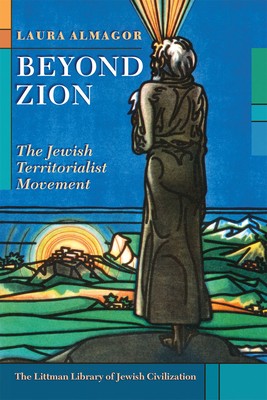
- We will send in 10–14 business days.
- Author: Laura Almagor
- Publisher: Littman Library of Jewish Civilization in Association with Liverpool University Press
- Year: 2022
- Pages: 304
- ISBN-10: 1789621259
- ISBN-13: 9781789621259
- Format: 16.4 x 23.8 x 2.3 cm, kieti viršeliai
- Language: English
- SAVE -10% with code: EXTRA
Reviews
Description
Jewish political and cultural behaviour during the first half of the twentieth century comes to the fore in this portrayal of a forgotten movement with contemporary relevance. Commencing with the Zionist rejection of the Uganda proposal in 1905, the Jewish Territorialist Movement searched for areas outside Palestine in which to create settlements of Jews. This study analyses the Territorialists' ideology and activities in the Jewish context of the time, but their thought and discourse also reflect geopolitical concerns that still have resonance today in debates about colonialist attitudes to peoplehood, territory, and space. As the colonial world order rapidly changed after 1945, the Territorialists did not abandon their aspirations in overseas lands. Instead, in their attempts to find settlement solutions for Europe's 'surplus' Jews, they moved from negotiating predominantly with the European colonizers to negotiating also with the ever more powerful non-Western leaders of
decolonizing nations.
EXTRA 10 % discount with code: EXTRA
The promotion ends in 23d.02:27:46
The discount code is valid when purchasing from 10 €. Discounts do not stack.
- Author: Laura Almagor
- Publisher: Littman Library of Jewish Civilization in Association with Liverpool University Press
- Year: 2022
- Pages: 304
- ISBN-10: 1789621259
- ISBN-13: 9781789621259
- Format: 16.4 x 23.8 x 2.3 cm, kieti viršeliai
- Language: English English
Jewish political and cultural behaviour during the first half of the twentieth century comes to the fore in this portrayal of a forgotten movement with contemporary relevance. Commencing with the Zionist rejection of the Uganda proposal in 1905, the Jewish Territorialist Movement searched for areas outside Palestine in which to create settlements of Jews. This study analyses the Territorialists' ideology and activities in the Jewish context of the time, but their thought and discourse also reflect geopolitical concerns that still have resonance today in debates about colonialist attitudes to peoplehood, territory, and space. As the colonial world order rapidly changed after 1945, the Territorialists did not abandon their aspirations in overseas lands. Instead, in their attempts to find settlement solutions for Europe's 'surplus' Jews, they moved from negotiating predominantly with the European colonizers to negotiating also with the ever more powerful non-Western leaders of
decolonizing nations.


Reviews